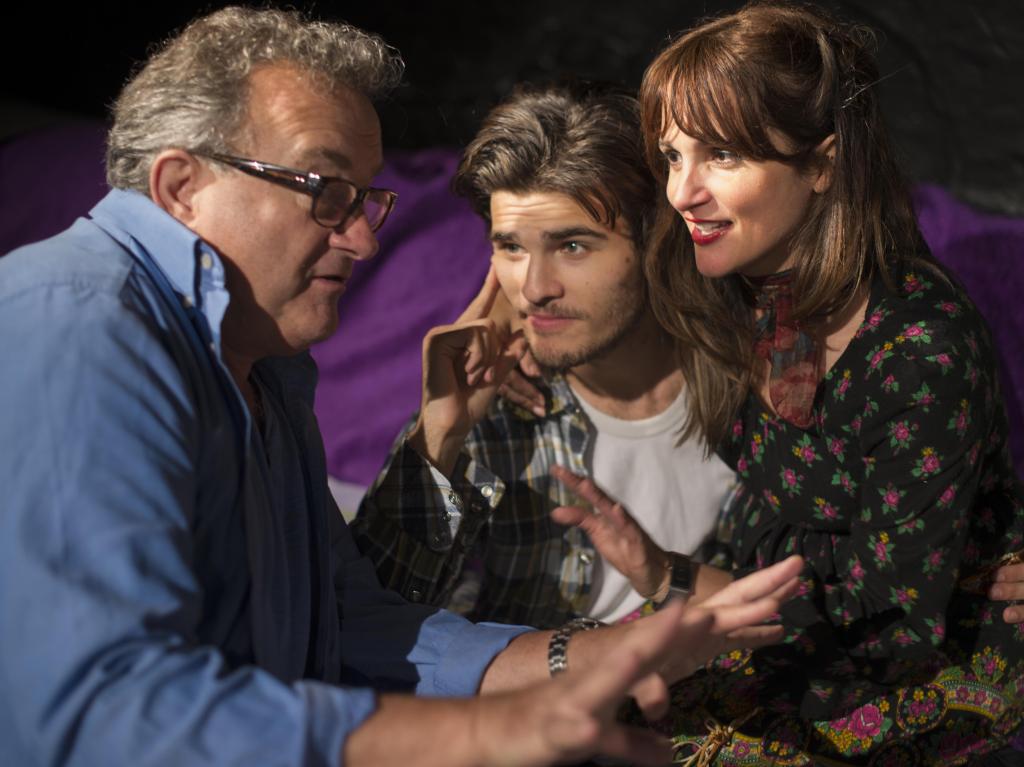Image supplied by La Mama
It is difficult to describe the plot of Zena Ladner: the show begins with actors (Julia Foenander and Michael Loder) rehearsing their scenes as Zena and Jack respectively for a play entitled Zena Ladner. Along with the help of writer Bill Marshall (Peter Rowley), the cast attempt to capture Marshall’s own personal story as a young man falling in love with an exotic older Turkish woman in London. The second-half, then, mainly shows the play-within-a-play itself, with glimpses of backstage moments. Finally, the real Zena Ladner (Sophie Sardi) actually appears to Marshall backstage, before the barriers between appearance and reality are promptly demolished. Zena Ladner consists of riveting ideas on theatre and artificiality, but its messy execution is its own downfall. The production itself suffers from some form of an identity crisis, unable to comfortably settle into its own skin.
When Zena Ladner first presents as a play about producing Zena Ladner, it carries a cheeky tone, such as the actors’ resentment of each other when playing lovers onstage. The funny one-liners and amusing gags are a nice touch, but the production takes a curious turn by showing the play-within-a-play uninterrupted for a good portion of the show. This abrupt change undoubtedly poses problems for Zena Ladner as it obscures any attempt in intentionality the initial half of the play had already set up for.
Since the performance onstage is now a play-within-a-play, there is an added layer of irony, which perhaps is unaccounted for. In one scene, as Jack puts on his coat, Zena exclaims, ‘You look like you’re a movie star!’ Jack smirks, ‘Well, life’s a movie…and I’m the star.’ The cringeworthy lines are met with stifled laughter; it seems that any deliberation in this execution is quickly lost. As a result, even the characterisation onstage is poor — is the audience meant to empathise with the actors? Or with Zena and Jack? Zena Ladner gives little space to develop these two sets of characters, which severely restricts Foenander and Loder from fully utilising the best of their acting talent. Rowley, on the other hand, is by far the most charismatic actor on stage. He plays various supporting characters for Zena Ladner and comes off as an endearingly bumbling man as Bill Marshall.
The production concludes with Rowley’s Marshall alone backstage, after the play-within-a-play Zena Ladner ends and the cast has left. Ifa, the woman Zena is based on, appears on a screen projection next to Marshall. The two interact convincingly, as though Ifa is really on stage, or in the very same room. Then, Marshall asks the most intriguing question of the entire production by far, ‘Who are you, really? I don’t even know what part of Turkey you are from!’ Certainly, this very question calls for a climatic conclusion, but this gripping moment is promptly lost – Ifa replies, ‘I can’t answer that, I’m not Ifa. I’m an actress.’ As a result, Rowley’s Marshall cries, ‘Oh…yes! I’m Peter Rowley. I’m an actor who’s playing Bill Marshall!’
The final breakdown of the fourth wall is complete, but it comes off more as a lazy cop-out to what would have been a starting revelation about the real Zena Ladner. Its weak ending frustrates and maybe even confuses. It could be argued that the ending is meant to reveal that there is no real Zena Ladner — she is a metaphor for art, an illusion of love, or the feigned mockery of theatre. Nevertheless, it seems disappointing that the production decides to peel one more layer, instead of fully exploring the many unanswered questions of the already complicated notions of the play and play-within-a-play, Zena Ladner. The play-within-a-play-within-a-play is reminiscent of a bad Inception reference — they’ve got in too deep, it is too difficult to reemerge from this labyrinth, so the easy way out is to end it right there.
Jacob Oberman makes his debut as a theatrical director for Zena Ladner, which is undoubtedly a worthy attempt. The script is heavy with intricate ideas, but it refuses to offer a bold, clear take on the issues it addresses. Apparently autobiographical in nature, it seems strange that the real Marshall attempts to take on what could be a conventional love story in such an unusual way. Zena Ladner lacks clarity in thought and execution; its half-hearted venture into becoming something more lacks a strong punch.
Zena Ladner struggles to make up its mind when addressing the larger thematic concerns of love, reality and theatre. Its schizophrenic voice gives rise to some elusive meta-commentary, a tale of romance, and a dash of Shakespearean drama. It attempts to show a certain sense of self-awareness, but ultimately, the production’s intentions are lost amid its overall uneven expression.
Rating: 2 ½ stars out of 5Zena Ladner
Written by Bill Marshall
Directed by Jacob Oberman
Performed by Julia Foenander, Michael Loder, Peter Rowley and Sophie Sardi
La Mama Theatre, Faraday St
www.lamama.com.au
23 April – 4 May





